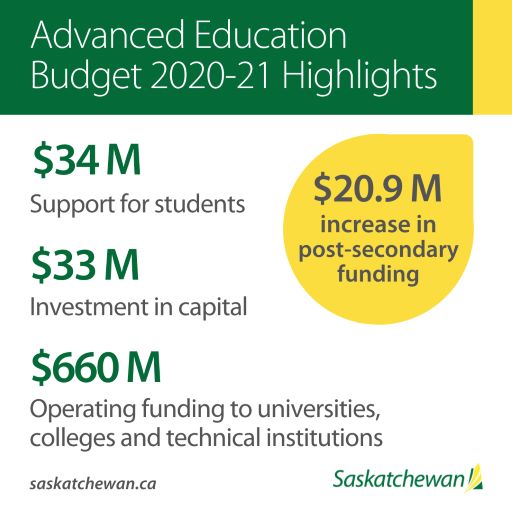Released on June 15, 2020
The Ministry of Advanced Education’s 2020-21 budget delivers increased support for Saskatchewan’s post-secondary students and institutions.
The $749 million budget provides expanded funding for the province’s student loans program, and operating grant increases for universities, federated and affiliated colleges, technical institutes and regional colleges.
“Our investment in post-secondary education is $20.9 million higher than last year,” Advanced Education Minister Tina Beaudry-Mellor said. “This funding provides increased support for students and the institutions they attend. Our goal is a strong, sustainable post-secondary sector that delivers the education Saskatchewan students need to successfully enter the workforce.”

The 2020-21 Budget provides $34 million in financial supports to students, including:
- $27 million to support the student loan program, which will provide approximately $90 million in repayable and non-repayable financial assistance to more than 19,000 students;
- $7.0 million for scholarships, such as the Saskatchewan Advantage Scholarship and the Saskatchewan Innovation and Opportunity Scholarship; and
- Up-front grants for students which see learners in a typical eight-month program receive up to $4,500 in combined federal and Saskatchewan assistance per year of study.
Another $694 million in operating and capital funding will go to post-secondary institutions, including:
- $472 million to the University of Saskatchewan, the University of Regina and the federated and affiliated colleges;
- $158 million to Saskatchewan Polytechnic, the Saskatchewan Indian Institute of Technologies and Gabriel Dumont Institute;
- $31 million to Saskatchewan’s regional colleges; and
- $33 million for capital projects and maintenance throughout the post-secondary sector, including $9.6 million for projects at the universities and the Saskatchewan Polytechnic Moose Jaw campus (part of a new two-year, $17 million investment) and $1.0 million for planning the Campus Renewal Project at Saskatchewan Polytechnic in Saskatoon.
“Solid partnerships between Saskatchewan’s post-secondary institutions, students, employers and government are an essential part of how we need to function going forward,” Beaudry-Mellor said. “Increased collaboration allows for a more efficient, sustainable sector able to position our province, and our students, for future economic opportunities.”
Beaudry-Mellor said her priorities for the sector include supporting pathways for students that span from education to a career, growing participation in international education and continuing to remove barriers to inclusion, especially for Indigenous students.
In addition, students continue to receive benefits after their studies through the Graduate Retention Program, the only retention program of its kind in Canada, which provides a rebate on tuition fees of up to $20,000 for eligible graduates who stay and work in the province. The Graduate Retention Program has provided $541 million in benefits to more than 74,000 graduates since its introduction in 2008.
-30-
For more information, contact:
Scott Brown
Advanced Education
Regina
Phone: 306-787-0355
Email: scott.brown@gov.sk.ca
